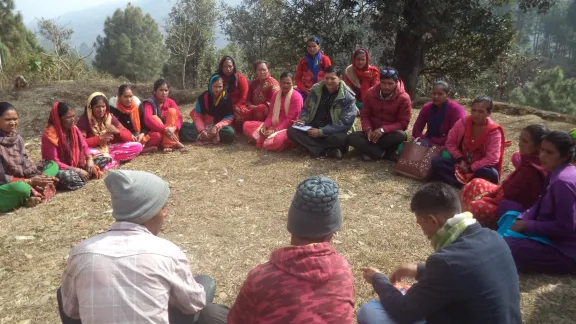Networking and Collaboration
Recognizing that we are more effective when we work with others, World Service operates through strategic partnerships and networks. Managing these relationships in a spirit of cooperation and mutual accountability is key to the future viability and effectiveness of our programs. These partnerships range from local communities to global networks.

Mr. Man Khatri (in green jacket) interacting with cooperative members from freed Haliya communities at Budar of Doti district. Photo: LWF Nepal
- UN Agencies ¶
- Ecumenical and Interfaith Partners ¶
- Global networks ¶
- Governments and Other Duty-bearers ¶
- LWF member churches and related organizations ¶
- Local Communities and Civil Society ¶
World Service’s long history and successful track record in humanitarian response makes us a major trusted implementing partner of UNHCR (United Nations High Commissioner for Refugees) and the World Food Programme (WFP) with the strategic goal to strengthen and improve these partnerships globally. We also participate in the UN Office for Coordination of Humanitarian Affairs (OCHA) coordinating structures and in UN networks dealing with specific thematic and operational issues, such as the United Nations Children’s Fund (UNICEF) and United Nations Development Program (UNDP).
As a founding member of the ACT Alliance, World Service continues to play an active role with other members on the ground, in country forums, with regional offices, and within the Geneva Secretariat. We strive to respond to emergencies through ACT mechanisms in a coordinated, timely, and effective manner.
Following the Joint Declaration of Intent signed by World Service and Caritas Internationalis in 2016, we aim to strengthen our relationship with the Roman Catholic Church to collectively create sustainable change in the lives of those who suffer from poverty, disaster, and marginalization.
We seek partnerships with organizations of other faiths in order to promote faithsensitive humanitarian and development work at policy and operational levels. In particular, we continue to explore opportunities with Islamic Relief Worldwide, based on a global Memorandum of Understanding renewed between the two organizations in 2017.
World Service participates in and contributes to other international humanitarian networks and organizations, including the Steering Committee for Humanitarian Response (SCHR); the Core Humanitarian Standard (CHS) Alliance; the International Council of Voluntary Agencies (ICVA); Voluntary Organisations in Cooperation in Emergencies (VOICE), and the Sphere standards network.
We support and actively participate in the development of the Global Compact on Refugees and the Comprehensive Refugee Response Framework (CRRF), and seek to integrate the Istanbul Principles into our plans and practices as part of a collective effort to increase development effectiveness.
Close dialogue and engagement with UNHCR are further strengthened at global levels by our presence in Geneva. We are active contributors to the Universal Periodic Review (UPR) process of the UN Human Rights Council and to the Committee on the Elimination of Discrimination against Women (CEDAW), which enables our global advocacy efforts to reinforce the effect we are aiming for at local and national levels.
World Service recognizes that the sustainability of any program relies on engaged and committed governments. Close working relationships with local, regional, and national governments enable us to work constructively with primary duty-bearers but also ensure humanitarian access. When responding to acute crises or working in restrictive environments, gaining access to the people and places where the humanitarian needs are the greatest forms the basis of our working relationship with governments and other stakeholders.
In parallel and depending on the context, we build capacity, improve coordination mechanisms between stakeholders on the ground, and hold duty-bearers accountable for the fulfillment of rights. While we seek to create synergies between state responsibilities and our own, we also work with communities and civil society to advocate to duty-bearers for change.
Indeed, in some places where we work, we recognize that people continue to live in vulnerable situations due to the inability or unwillingness of duty-bearers to fulfil their responsibilities. Governance authorities may also be contested in some contexts which further hampers their ability to meet their responsibilities. Even in these situations, LWF World Service, in keeping with its rights-based vision, seeks to ensure access to rights and services for all.
Local Communities
Collaboration with local communities and populations is critical to ensure that programs involve the most appropriate people in the most suitable way. The nature and extent of these relationships vary depending on the context. Communities can range from grassroots or village community-based organizations to local churches or other faith-based groups. The voice of local communities is included in all aspects of the project cycle, and it is to them that we are ultimately accountable.
Civil Society
We connect community members and community-based initiatives and organizations with other civil society actors in order to amplify their voices, effect positive policy change and ensure that implementation at the local level is extended to all rather than to a few. Civil society actors include local, national and international NGOs and faith-based actors such as our own member churches.
